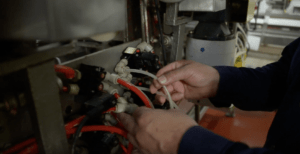KATHY MCAULIFFE
You want to apply right now for a nice job you just discovered.
Stop! Take a breath.
Have you rewritten your professional summary yet? Your professional summary sits strategically at the top of your resume, and encapsulates your relevant skills and experience. That’s why it’s so important.
What is a Professional Summary?
Your professional summary is a kind of snapshot of you, the professional, and often makes your first impression to the HR person, staffing specialist or hiring manager. Most importantly, it shows how you are a fit for the job.
Your professional summary is filled with your most sought-after skills, abilities, accomplishments and attributes as they pertain to the particular job — and company — for which you are applying. It must clearly show your fit for that particular position. Additionally, any statements made in your professional summary must be supported by information in the body of your resume (as well as in your cover letter).
It is NOT an objective statement, which usually states that you are seeking such-and-such opportunity at such-and-such company. You don’t need to tell an employer that you are seeking a job at their company; they already know that because they’re looking at your resume!
We are here to tell you that it will be worth the work you put into your professional summary. Many HR and workforce development professionals say it is the grabber, the thing that quickly separates you from the pack of applicants.
“Show them why they need to meet with you; why you’re a strong candidate for the position. Let’s face it: busy hiring managers are going to skip over your cover letter. The professional summary is your shot to get their attention.”
Tony Levine, Industrial Division Manager of Banner Personnel Service, Inc. in Naperville
Tony Levine, Industrial Division Manager of Banner Personnel Service, Inc. in Naperville, concurs. “I cannot stress enough the importance of a well-written job summary or narrative…tailored to the specific job for which you are applying, and…focusing on the intangibles that aren’t already listed on your resume,” he states.
“Show them why they need to meet with you; why you’re a strong candidate for the position. Let’s face it: busy hiring managers are going to skip over your cover letter. The professional summary is your shot to get their attention.”
Lori Kramer, PHR, and Human Resources Representative-Illinois for Wheaton Franciscan Healthcare, says, “I think a professional summary is a nice introduction on candidates’ resumes to show their specific experience, and skills for a specific job. I caution people that if they use the summary it should be for the specific industry as a highlight.”
Kramer gives the example of applying for a Human Resources job. “In the professional summary some of the skills would be compensation, benefit administration, full life cycle recruitment. Make sure if you also apply for something other than Human Resources, that you tweak the summary.”
“Make sure that your cover letter highlights specific things about the position that your professional summary confirms,” Kramer adds.
So, where to begin writing this compact little statement, this sparkling diamond that many professionals firmly believe will flash and catch the hiring professional’s eye? Here are some ideas.
Writing your Professional Summary
You should highlight skills that directly pertain to that particular job, but basic skills should be included only for entry-level jobs. For example, proficiency in MS Office should be included in your summary only if you’re applying for an entry-level admin job. For higher-level jobs, proficiency in MS Office will be assumed by the employer, and it can be included elsewhere on your resume (such as a Skills section).
Watch out for worn out words, catch phrases and overused descriptors such as results-oriented, hardworking, team player, and self-motivated. You know, all those words the hiring manager will see on everyone else’s resume. These are excellent traits but express them instead through listing your specific achievements. Use a thesaurus if you have to. Find good, appropriate words that substitute for the knee-jerk buzzwords everybody throws in there.
Your goal is to write four to six sentences or bullet points that highlight your qualifications.
Research the Job
Write down whatever you learn or assume about the job, so you can refer to this while constructing your professional summary. For example:
- What type of background, experience, skills, personality, level, talent, etc. are they seeking?
- What would you be doing in the position?
- What is the company’s business, reputation, size, values, mission, etc.?
- Think about what the employer hasn’t mentioned that you know or assume (based on experience) would be important for the job.
- Talk with anyone you know who might know more about the position, or find someone through LinkedIn.
Be Specific
- Focus on how you’re a benefit to the company…not how the company can benefit you.
- Use industry-specific terminology where appropriate
- List your achievements and qualities as they pertain to the job and company.
Be Concise
- You have limited space for all the elements of your resume. Make the best use of it!
- SHOW you are a fit – don’t simply state it!
- Boil down your main points – your highlights – into four to six concise, compact sentences that show how you are a fit for the position.
Rewrite and Edit
Carefully write and rewrite the summary for optimal results. In a few clear words describe your experience, accomplishments, primary and secondary skills, job objectives, and personal characteristics.
Make Sure Everything Hangs Together
- Whatever you state in the body of your resume must be supported by your Professional Summary, and vice versa. That includes the title with which you “top” your summary.
- Make sure you have used key words that reflect your fit to the job description. These will jump out for the Applicant Tracking System (ATS), and at the person reading the resume.
Run it Past a Good Writer or Career Counselor
Ask somebody to read this completed version of your resume. Another pair of eyes is always critical when we compose documents. And somebody with experience in job search can give good advice in the process. OK, we know this is the ideal situation — having somebody available to go over each version of your resume. At least do it until you are confident you have the technique “down.”
Sample Professional Summary
Professional summaries are not “one size fits all” – you must create a summary specifically about your fit for a particular job. However, here’s an example of a good professional summary, to help you get started writing your own:
An experienced Sales and Marketing professional with a strong background in automotive and electronics industries. Proven expertise with new market development through various media including online advertising and telemarketing sales. Successfully hires, trains and develops successful sales representatives. Excellent teamwork skills and a long track record of success with innovative, challenging assignments.
Just Do It – It’s Easy!
We’re kidding. No, it’s not easy to write an effective professional summary. It’s one of the hardest parts of marketing yourself. It’s like a written-out elevator speech. It takes a lot of analysis, careful and concise thinking and writing, and self-awareness. But a well-written professional summary is a crucial part of an effective resume.
The ideas presented above should help you write a professional summary that will get you noticed by an employer!






